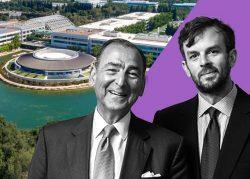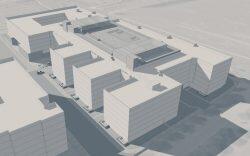The Mehran family’s “American Dream” began when patriarch Masud Mehran fled Iran in the 1940s. After an arduous journey to New York, Mehran and his young family made their way to the East Bay city of Livermore, where he began a home-building business. By the 1960s his company, Sunset Homes, was building 350 homes a year. In the mid-70s Mehran asked his son, Alexander, then a banker in New York City, if he would come home and take over the family business. The father-and-son team began a state-wide search for a large property to develop, homing in on sites that were near a freeway and already had utility services onsite to develop.
Bishop Ranch in San Ramon, right off the Interstate 680 freeway that runs north-south through the East Bay, fit all of their requirements. The former pear orchard had been purchased by Western Electric in the 1960s to create a factory for its telephone switching gear and housing for its employees. When the semiconductor revolution made the factory unnecessary, the telephone company scrapped its plans and sold 585 acres to the Mehrans’ nascent Sunset Development Company in 1978.
The Mehrans wanted to build a mixed-use development with industrial, office and residential components, with the housing coming first since that was what the company had created until that point. But the city, which was almost entirely residential at the time and had anticipated thousands of jobs from the factory that never came, were “outraged” at the thought of any new residential projects, Alexander Mehran recalled.
“The city really wanted to have employees rather than being just a bedroom community,” he said. “My dad and I put our heads together and said, ‘Let’s start building some office space.’ And so we built a 100,000 feet of office space in 1980 and filled it, and then just kept on rolling.”
The developers would end up creating ten million square feet of office space, with over 500 companies calling the office park home.
Over 40 years later, the plans for Bishop Ranch are about to come full circle. Mehran’s son, Alexander Mehran Jr., came on board 12 years ago just as his father did a generation before, and the company brought forth a new master plan to tear down some of the property’s older office buildings and create retail, dining and, yes, housing. This time, with the city now desperate for housing to fulfill its state-mandated requirements, the idea has been enthusiastically received.
The retail and dining component came first, with the $300-million 300,000-square-foot City Center opening in late 2018. Now 6,000 planned housing units are also on the way. At the end of last year, Sunset announced the sale of a 31-acre parcel to SummerHill Homes to develop three residential neighborhoods and are also in the process of selling land to Related California for a luxury apartment building.
In an exclusive interview, Sunset CEO Alexander Mehran, Jr. and Chairman Alexander Mehran Sr. talked to The Real Deal about how the next generation of Bishop Ranch is intricately connected to the next generation of their family-run development company. Their answers have been edited for space and clarity.
What was it like growing up in a developer dynasty?
AH Jr.: My grandpa probably spoke more about the business. My dad intended for us kids to be able to have our own thoughts and ideas about what we do. When I graduated, I got a job in New York and found that the competitiveness of being involved in investment banking was sort of fun. It was similar to the competitiveness that I’d experienced in sailing, which I really loved. So having that intense experience in New York taught me that being involved in business isn’t boring. I started to learn more about what my family was doing and to understand and appreciate the benefits that you could have by working with family members versus being in a corporate environment.
We really are more about being a family business at this stage. My dad’s a real estate developer, my grandfather was primarily a housing developer, and I’m a family business person.
What is the distinction?
AH Jr.: Primarily what I do is try to keep the family elements but adapt to make sure we survive and we do the best we can here. We’ve made some big changes about how we run the company. We bought the building I’m in now just as my granddad was in his last days. One of his big things was ‘never have any partners.’ It would’ve been a big financial risk for us to buy this building without a partner and my dad and I decided that we were going to partner with MetLife because we trusted them. We had to make a judgment that my granddad was thinking about different types of partners that he had had in the 1950s who weren’t companies like MetLife, and that we had to sort of overrule one of the rules––literally right after my grandpa had passed.
AH Sr.: There is an important legacy issue here. I am the child of Iranian immigrants. Alexander is the grandchild of Iranian immigrants. Our company is the flag that my parents planted in America that represented all the values that attracted them to this country. We feel very strongly that from my father starting the business and building it up, to my taking it over and expanding it, to Alexander taking it over and transitioning it, our business is really about those American values of business and freedom and rule of law and fair play.
Since the family component is so important to your business model, was it a hard decision to sell a chunk of Bishop Ranch to SummerHill Homes?
AH Jr.: My dad did an incredible job of making one of the world’s best business parks. It had beautiful landscaping, beautiful signage, crisp, very corporate. In the ‘80s and ‘90s, it worked great. When you have a CEO deciding where to put their operations in the East Bay, they drive in and think, “This is me.”
Then the whole world of selection of space became very democratized, with corporate real estate departments and HR and all these different groups. People said, we want to have Philz Coffee, we want to have this and that. We’ve had to dramatically change everything. My landscape now is drought tolerant with walking trails, and we have farmer’s markets and food trucks.
San Ramon was us in the middle, on the freeway, and then a bunch of subdivisions, which were beautiful––big houses out in the hills. To be able to add higher density housing in the middle of San Ramon in a walkable environment really rounds out that downtown feeling.
So to take some of our older buildings, tear them down and add 400 brand new houses where there’s going to be individuals that can work in the office buildings, it’s really just a great leap forward in terms of making those changes that we need to make. If we were trading like a normal real estate company, it would probably be different. But when we look at Bishop Ranch as a whole, it was an easy decision to say, yeah, we need to move those tenants into newer buildings and build these houses to start accelerating the pace of change here. We’re pretty excited about it.
Did you consider doing that in-house as opposed to selling the property?
AH Jr.: We don’t want to be in for-sale housing. We just got into the retail business, and that was a big pain. We’re not doing that again.
We wanted to control the retail site and, in retrospect, that was a great decision my dad had––to own and control that. But it was very painful to get from there to here.
How so?
AH Jr.: This whole time’s been sort of a retail apocalypse, plus we’re doing something incredibly different. We had to learn to fly while we were already in the air. I hired a bunch of people from the Irvine Company who really knew the rule book, because there’s a rule book in retail development, to help us understand which rules we could break for the better and which rules we couldn’t break.
For example, the parking has to be perfect. You have to be able to get in and get out without any problems, but normally a retail project has a back of house where you pull a truck in, people can smoke and unload packages and we don’t have that. So we’re still working on where to make people smoke. That is a problem. But luckily that’s less popular these days.
It’s a lot of work, but it means that the whole exterior of the project looks like an inviting beautiful glass facade, which is the nature of a downtown. If you’re in New York, you’re not going to go on one side and see a horrible back of house. It’s pretty elegant what they did, but it took a lot of work and it was expensive. In the long term, it’ll be a good thing.
As far as housing goes, there’s thousands more units planned than just the SummerHill Homes parcel and the Related apartments. Will other plots be sold off as well?
AH Jr.: We’ll probably do a mix of things. There’s a lot of different products and a lot of units. So we’re going to keep pushing and some of it we’ll own and build and some of it we’ll partner with people.
As the third generation coming onboard, did you have ideas about making big changes at Bishop Ranch from the get go?
AH Jr.: I definitely didn’t come on board with any specific ideas. I wasn’t—
AH Sr.: I have to interject here. There’s a whole new aesthetic that he has brought that is a much more modern aesthetic. He has done things that resonate with our current customers who are not my age, but his age. I was dealing with people my age when I was his age, and he’s dealing with people his age at his age.
AH Jr.: I’d say, primarily, I want the place to feel like California. If we can create a walkable environment that’s more dense than it is now, erase the surface parking lots and, in their place, add a diversity of different building types and different architectural types that are extremely walkable, that’ll be a big success. And, of course, if we can get to the fourth generation.
How old are your kids?
AH Jr.: Four, seven, nine and ten.
So it may be awhile before they take the reins. But are you talking to them about what their family does and what they might do?
AH Jr.: Well, it’s a lot different growing up 10 minutes from the site when your dad and grandpa just developed the coolest new shopping center in the whole area than it was when I was growing up in San Francisco and my dad developed a bunch of office buildings an hour away. So I think I have a little more cred. But if they find what they are passionate about and there’s something that they want to be, a scientist or artist or journalist or whatever, I hope they do that. But if they see merit in this, then that’d be cool, too.
Since we’re looking ahead, is there a timeline for when the completed vision for Bishop Ranch becomes a reality?
AH Sr.: I think what’s happening now shows that it is never ending. If you told me when I started in 1978 that I would build a building—not only one, not two, but six buildings—that would come down in my lifetime to be replaced by shopping and residential, I would’ve been dumbfounded. I have no idea what Bishop Ranch 2050 looks like, but I do know it will be different and, under our leadership, it will be of high quality.
AH Jr.: My kids better not tear down the buildings that we build. But they might!
Read more



